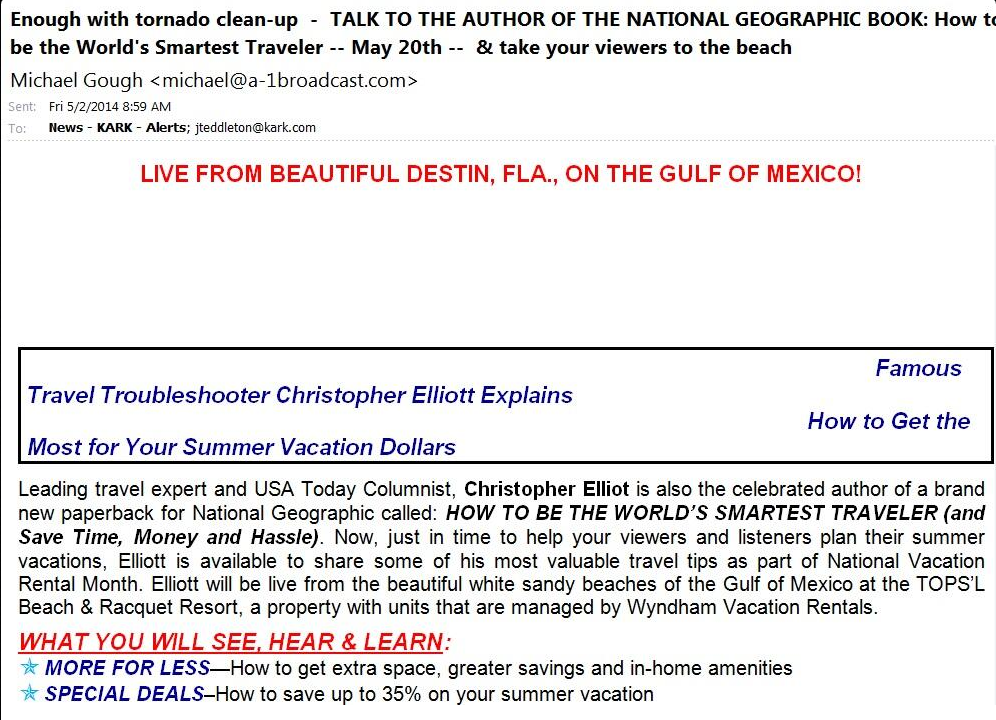Days after a EF4 tornado tore up Central Arkansas and killed 15 people last week, this press release arrived in the local TV weather team’s inbox:

Print readers, see flatheadbeacon.com/images/uploads/ARTornadoPRFullSize.png
Saying “enough with the tornado clean-up” to a media person in the area of a killer tornado in question is at best, someone being an inattentive and/or insensitive jerk. The media person who receives it is likely to not only delete your message, but put you on their email block list.
That isn’t why you send press releases.
Why press releases?
If you haven’t written for a newspaper or magazine, or worked for a media agency, you may not realize that many of the stories you see start with ideas seeded with press releases.
Sending press releases to your local media, and selected national media (such as the editor of a nationally-read newspaper, blog, magazine, podcast, etc) can make sense to draw attention to your business and what it’s up to, but only if you don’t make a few key mistakes.
What qualities do effective press releases for small business have, and what should you watch out for? As with any other marketing piece – what matters is your understanding of and ability to reach the audience.
That doesn’t mean your PR should grind to a halt every time there’s a disaster of some kind, but you should make these efforts with care.
What media people need from your press release
Media people need story ideas, but not just any old story idea.
They need story ideas of interest to their readers, which means you need to consider their audience and what’s on their mind.
This isn’t about how many people you can get to see your press release. It’s about how many of the RIGHT people see it.
Doesn’t that sound exactly like the kind of content that you’d create when direct marketing? Of course.
Media people don’t need spam. Like you, they get plenty.
Getting stuff you don’t want to read and aren’t interested in (ie: spam, junk mail) is an annoying waste of time. Why would you expect the reader of your press release to feel differently?
What media people don’t need from your press release
They don’t need you to waste their time
When you send a press release about your new sailboat trailer product line to a writer for a national magazine for electricians, the message they get is something like this: “My story is more important than anything you’re doing, so I think it’s OK to waste your time by telling you about something that has nothing to do with your readers’ interest, much less your publication’s chosen subject matter.”
Media people don’t need story ideas that have nothing to do with what they write about / what their publication covers.
If there’s a tangent that does apply for a seemingly off-topic press release, you’d better make your point quickly. Let’s use the sailboat press release as an example.
If your sailboat product line press release reads like something sailboat owners want to read – DON’T send it to the electrician publication.
On the other hand, if there is a unique technique or technology that you used during your manufacturing process handled grounding, wire protection, or wiring that spends time underwater, then write a press release specific to those topics. That’s something the electricians who don’t sail are more likely to care about.
Media people don’t want to see press releases about stuff their readers don’t care about.
I get press release emails quite often because of this column. I can think of one in the last seven years that had anything to do with small business. That one press release was not about an author’s just released romance novel – and yes, I do get those PR emails.
Think twice before you send
If you look over the press release image, you’ll see that the PR agent’s client is an author and that author appears to have some sort of relationship with Wyndham resorts.
If you’re the author or an employee, manager or stockholder of Wyndham, would you want that PR email blast associated with you?
I sure wouldn’t.
You do PR so people will discuss and hopefully promote the subject matter in your press release. Take care what you send and send it to someone whose audience genuinely cares about the topic.
Simple, right?
Want to learn more about Mark or ask him to write about a strategic, operations or marketing problem? See Mark’s site, contact him on Twitter, or email him at [email protected].